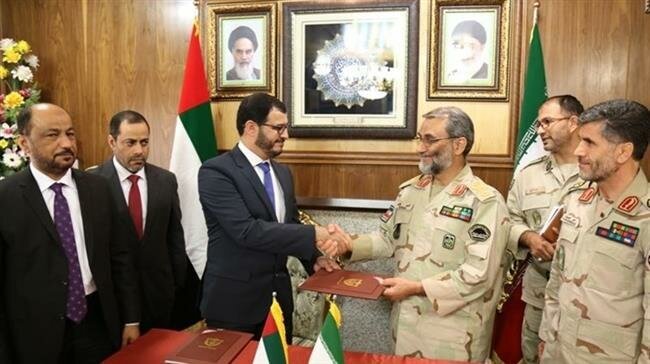Tehran, Abu Dhabi sign MOU on maritime security cooperation

TEHRAN – The United Arab Emirates and Iran on Thursday signed a memorandum of understanding (MOU) to enhance maritime border security cooperation.
The document was signed during a meeting in Tehran by the commander of Iran’s Border Police Brigadier General Qassem Rezaie and the UAE Coastguard Commander Brigadier General Mohammad Ali Mosleh al-Ahbabi.
This was the first time in six years when senior officials from Iran and the UAE met in the Iranian capital to discuss ways of boosting maritime security.
Following the meeting, the Iranian border police chief said the document was designed to boost border cooperation and interaction between the two Persian Gulf states.
He added that regular meetings between officials of the two countries could help further increase border interaction, facilitate matters for business persons and fishermen from the countries, and also help fight moves to disrupt maritime security.
Al-Ahbabi, for his part, described the MOU as a “positive step” which can serve the two countries’ interests in the region, augment border security, ease border control and facilitate crossings.
Tehran and Abu Dhabi held their last such gathering in Tehran in October 2013. The latest meeting comes following a chain of naval accidents in the region’s waters.
In May, explosions hit four commercial vessels from the UAE and Saudi Arabia off the Emirati port of Fujairah in the Persian Gulf.
A month later, two blasts hit a Japanese and a Norwegian-owned vessel in the Sea of Oman. Iranian naval forces gave a quick response to the distress calls from those ships and rushed to rescue their crew members.
The United States soon tried to implicate Iran in the incidents to suggest that the Islamic Republic was trying to retaliate for bids by Washington and its allies to trouble the Islamic Republic’s international oil sales.
On June 15, however, Emirati Foreign Minister Sheikh Abdullah bin Zayed Al Nahyan said his country did not have enough evidence to blame any country for the previous month's naval attacks.
Japan and Germany also refuted Washington’s accusations against Iran in the second incident.
Iran has roundly rejected Washington’s claims of Tehran’s involvement in such incident. It has also voiced concern about adventurism by foreign players to disrupt maritime navigation in the Persian Gulf region.
Tehran has also said that, one way or another, it would sell its oil despite the illegal and unilateral U.S. sanctions against Iran, but has categorically rejected recourse to violence to make that happen.
SP/PA
